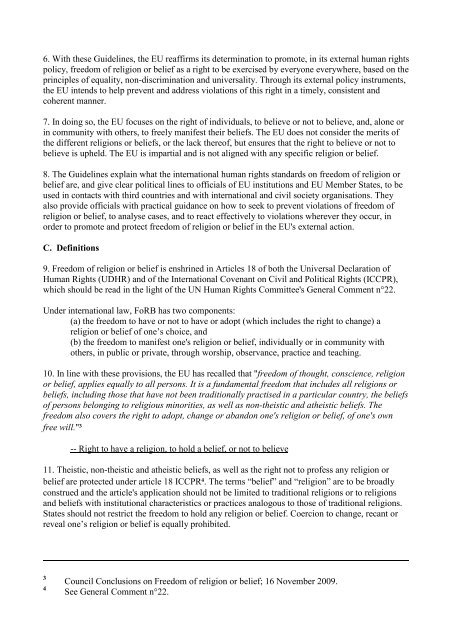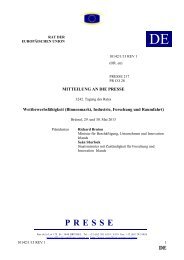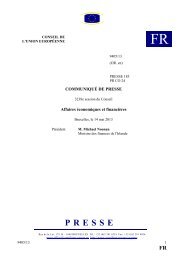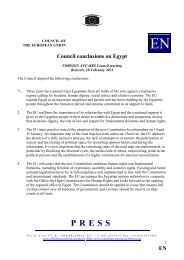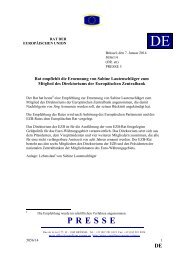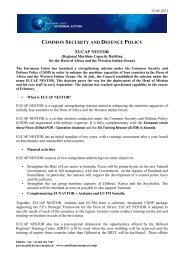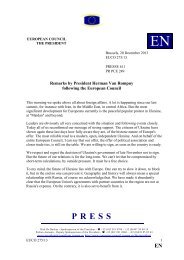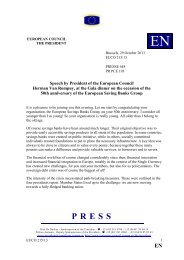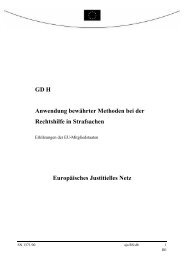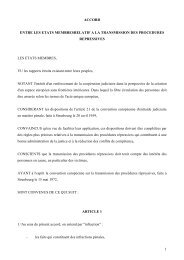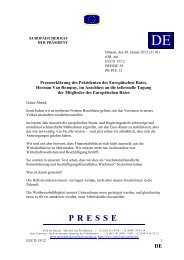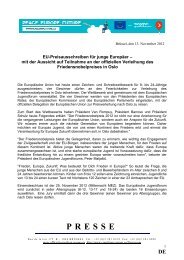EU Guidelines on the promotion and protection of freedom of ...
EU Guidelines on the promotion and protection of freedom of ...
EU Guidelines on the promotion and protection of freedom of ...
You also want an ePaper? Increase the reach of your titles
YUMPU automatically turns print PDFs into web optimized ePapers that Google loves.
6. With <strong>the</strong>se <str<strong>on</strong>g>Guidelines</str<strong>on</strong>g>, <strong>the</strong> <str<strong>on</strong>g>EU</str<strong>on</strong>g> reaffirms its determinati<strong>on</strong> to promote, in its external human rights<br />
policy, <strong>freedom</strong> <strong>of</strong> religi<strong>on</strong> or belief as a right to be exercised by every<strong>on</strong>e everywhere, based <strong>on</strong> <strong>the</strong><br />
principles <strong>of</strong> equality, n<strong>on</strong>-discriminati<strong>on</strong> <strong>and</strong> universality. Through its external policy instruments,<br />
<strong>the</strong> <str<strong>on</strong>g>EU</str<strong>on</strong>g> intends to help prevent <strong>and</strong> address violati<strong>on</strong>s <strong>of</strong> this right in a timely, c<strong>on</strong>sistent <strong>and</strong><br />
coherent manner.<br />
7. In doing so, <strong>the</strong> <str<strong>on</strong>g>EU</str<strong>on</strong>g> focuses <strong>on</strong> <strong>the</strong> right <strong>of</strong> individuals, to believe or not to believe, <strong>and</strong>, al<strong>on</strong>e or<br />
in community with o<strong>the</strong>rs, to freely manifest <strong>the</strong>ir beliefs. The <str<strong>on</strong>g>EU</str<strong>on</strong>g> does not c<strong>on</strong>sider <strong>the</strong> merits <strong>of</strong><br />
<strong>the</strong> different religi<strong>on</strong>s or beliefs, or <strong>the</strong> lack <strong>the</strong>re<strong>of</strong>, but ensures that <strong>the</strong> right to believe or not to<br />
believe is upheld. The <str<strong>on</strong>g>EU</str<strong>on</strong>g> is impartial <strong>and</strong> is not aligned with any specific religi<strong>on</strong> or belief.<br />
8. The <str<strong>on</strong>g>Guidelines</str<strong>on</strong>g> explain what <strong>the</strong> internati<strong>on</strong>al human rights st<strong>and</strong>ards <strong>on</strong> <strong>freedom</strong> <strong>of</strong> religi<strong>on</strong> or<br />
belief are, <strong>and</strong> give clear political lines to <strong>of</strong>ficials <strong>of</strong> <str<strong>on</strong>g>EU</str<strong>on</strong>g> instituti<strong>on</strong>s <strong>and</strong> <str<strong>on</strong>g>EU</str<strong>on</strong>g> Member States, to be<br />
used in c<strong>on</strong>tacts with third countries <strong>and</strong> with internati<strong>on</strong>al <strong>and</strong> civil society organisati<strong>on</strong>s. They<br />
also provide <strong>of</strong>ficials with practical guidance <strong>on</strong> how to seek to prevent violati<strong>on</strong>s <strong>of</strong> <strong>freedom</strong> <strong>of</strong><br />
religi<strong>on</strong> or belief, to analyse cases, <strong>and</strong> to react effectively to violati<strong>on</strong>s wherever <strong>the</strong>y occur, in<br />
order to promote <strong>and</strong> protect <strong>freedom</strong> <strong>of</strong> religi<strong>on</strong> or belief in <strong>the</strong> <str<strong>on</strong>g>EU</str<strong>on</strong>g>'s external acti<strong>on</strong>.<br />
C. Definiti<strong>on</strong>s<br />
9. Freedom <strong>of</strong> religi<strong>on</strong> or belief is enshrined in Articles 18 <strong>of</strong> both <strong>the</strong> Universal Declarati<strong>on</strong> <strong>of</strong><br />
Human Rights (UDHR) <strong>and</strong> <strong>of</strong> <strong>the</strong> Internati<strong>on</strong>al Covenant <strong>on</strong> Civil <strong>and</strong> Political Rights (ICCPR),<br />
which should be read in <strong>the</strong> light <strong>of</strong> <strong>the</strong> UN Human Rights Committee's General Comment n°22.<br />
Under internati<strong>on</strong>al law, FoRB has two comp<strong>on</strong>ents:<br />
(a) <strong>the</strong> <strong>freedom</strong> to have or not to have or adopt (which includes <strong>the</strong> right to change) a<br />
religi<strong>on</strong> or belief <strong>of</strong> <strong>on</strong>e’s choice, <strong>and</strong><br />
(b) <strong>the</strong> <strong>freedom</strong> to manifest <strong>on</strong>e's religi<strong>on</strong> or belief, individually or in community with<br />
o<strong>the</strong>rs, in public or private, through worship, observance, practice <strong>and</strong> teaching.<br />
10. In line with <strong>the</strong>se provisi<strong>on</strong>s, <strong>the</strong> <str<strong>on</strong>g>EU</str<strong>on</strong>g> has recalled that "<strong>freedom</strong> <strong>of</strong> thought, c<strong>on</strong>science, religi<strong>on</strong><br />
or belief, applies equally to all pers<strong>on</strong>s. It is a fundamental <strong>freedom</strong> that includes all religi<strong>on</strong>s or<br />
beliefs, including those that have not been traditi<strong>on</strong>ally practised in a particular country, <strong>the</strong> beliefs<br />
<strong>of</strong> pers<strong>on</strong>s bel<strong>on</strong>ging to religious minorities, as well as n<strong>on</strong>-<strong>the</strong>istic <strong>and</strong> a<strong>the</strong>istic beliefs. The<br />
<strong>freedom</strong> also covers <strong>the</strong> right to adopt, change or ab<strong>and</strong><strong>on</strong> <strong>on</strong>e's religi<strong>on</strong> or belief, <strong>of</strong> <strong>on</strong>e's own<br />
free will." 3<br />
-- Right to have a religi<strong>on</strong>, to hold a belief, or not to believe<br />
11. Theistic, n<strong>on</strong>-<strong>the</strong>istic <strong>and</strong> a<strong>the</strong>istic beliefs, as well as <strong>the</strong> right not to pr<strong>of</strong>ess any religi<strong>on</strong> or<br />
belief are protected under article 18 ICCPR 4 . The terms “belief” <strong>and</strong> “religi<strong>on</strong>” are to be broadly<br />
c<strong>on</strong>strued <strong>and</strong> <strong>the</strong> article's applicati<strong>on</strong> should not be limited to traditi<strong>on</strong>al religi<strong>on</strong>s or to religi<strong>on</strong>s<br />
<strong>and</strong> beliefs with instituti<strong>on</strong>al characteristics or practices analogous to those <strong>of</strong> traditi<strong>on</strong>al religi<strong>on</strong>s.<br />
States should not restrict <strong>the</strong> <strong>freedom</strong> to hold any religi<strong>on</strong> or belief. Coerci<strong>on</strong> to change, recant or<br />
reveal <strong>on</strong>e’s religi<strong>on</strong> or belief is equally prohibited.<br />
3<br />
4<br />
Council C<strong>on</strong>clusi<strong>on</strong>s <strong>on</strong> Freedom <strong>of</strong> religi<strong>on</strong> or belief; 16 November 2009.<br />
See General Comment n°22.


